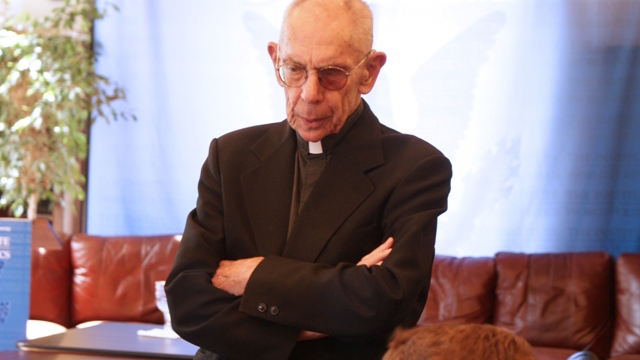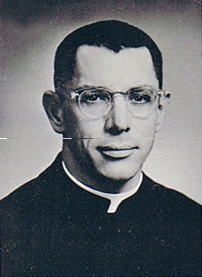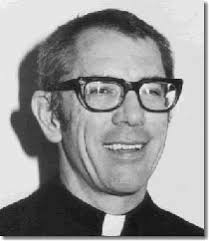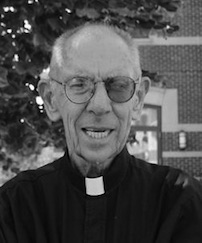Robert Royal
I’d known the good padre’s work before I came to Washington in the early 1980s. Around then, I reviewed somewhere his book The Politics of Heaven and Hell. A new DC friend warned me, “Be careful about reviewing books by Schall. You start doing that, and you’ll never do anything else.” I never wrote another review of Schall (though maybe Another Sort of Learning?). I have tried (unsuccessfully) to keep up, nevertheless to incalculable benefit. But I also benefitted, thanks to the friendship of Denise and Dennis Bartlett, colleagues of Schall’s when they were together in San Francisco. They began to invite us all to their DC home for birthdays, holidays, special occasions (book parties, to be sure). So for over twenty years, the Bartlett and Royal families and magister Schall lived some high moments together. My children didn’t realize until they were adults that the unassuming and amusing priest they knew was also a certifiably world-class Catholic brain. But familiarity and normalcy were of a piece with his vast, wide-ranging, insightful oeuvre , because in the Schallian scheme, everything true is an intelligible and related part of “what is” (a phrase he has often intoned with near magical effect). For most of us, it’s not as easy to know “what is” as we think. But that’s why we need and – as generations of his formal and informal students know – are eternally grateful to the Creator for these 90 years – may there be many more – of James Schall.
Hadley Arkes
In the early 1980s, I was on leave from Amherst College, visiting at Georgetown. An unanticipated gift: Jim Schall was my new colleague, and became an enduring blessing. We took long walks through Georgetown, and we would think aloud, together, on questions in political philosophy that we were trying to answer – and to explain to students. When I finally came into the Church, in 2010, Fr. was with me, to concelebrate.
One thing that fascinated us were the teachings of my former professor, Leo Strauss, on the tension between reason and revelation. John Paul II would write on this in Fides et Ratio. But long before, Fr. Schall had said some of the most sensible things about the problem: “Revelation can be articulated because it contains logos.” Both revelation and reason, then, were only accessible to a creature that had the wit to sift the claims of revelation that were plausible and implausible: “If what is said to be revealed is irrational or contradictory,” it cannot be believed, even according to revelation.” This has political as well as purely philosophical implications: “Ironically,” it turns out that we will not understand the world if it is only the world we seek to understand. [And] we often suspect, at our highest moments, that in being in this world, we are not made only for it, dear as it can seem to be.”
Looking ahead to that world, Fr. ends notes: “Pray for me . . . Jim.” And I ever will.
Bruce Fingerhut
Here is a man who taught hundreds of students every year, always reading and responding directly to them rather than using an assistant. He suffered from physical difficulties and never spoke of it; he wrote major articles from history to philosophy, from basketball to Catholic understanding; here is a man whose relations with young and old alike centered in intelligence, learning, and friendship, but in the end, I believe, the greatest gift he has given us is purpose. For all of us who have had the honor to know him, it is to realize how green is our valley.
Matthew Hanley
I did not have the benefit of Fr. Schall’s instruction in college. But at that age, like most products of our ambient culture, I doubt I’d have absorbed a fraction of the wisdom he had to offer. Still, a time came, early in my professional life, when I needed to go digging for meaty Catholic commentary: for firm fidelity in a hostile cultural environment, and for felicity in putting forth the relevant reasoning. And like anyone who goes looking for such things, I found the name Schall.
Thank God Schall did not limit himself to the classroom! His prolific corpus is a lifetime act of generosity; his wide range of subject matter attests to the interlocking truths of the faith and of reason he so cherished and defended at every turn. But what impresses me even more is the fact that he has done all this while enduring, shall we say, rather dispiriting developments in higher education – when most curricula typically frown upon confronting cultural collapse, even with good cheer.
Few will match his output, but we will need many to emulate his faithfulness – in a time where that quality may well mean an uncomfortable embrace with various degrees of estrangement.
Daniel Mahoney
Father Schall is a gifted political philosopher, an indefatigable student of the Church and the world, and one of the great defenders of the “natural order of things” – of “what is,” as he likes to say. He still participates in public and scholarly discussions with the energy of a man half his age. I have known him since 1983, and have followed his books and writings; surprisingly, he has followed and encouraged my own work over the years. He is one of the great Catholic critics of the ideological distortion of reality – of the lies that increasingly dominate late modernity. As the Church is tempted in this new Franciscan dispensation to once more “kneel before the world.” (Jacques Maritain), Father Schall is more indispensable than ever. He resists the temptation to “immanentize the eschaton” – to reduce Christianity to a humanitarian project of this-worldly amelioration. Lucid and informed about political economy, he resists the lie that “the poor are poor because the rich are rich.” He rebukes the pacifist delusion that “war is always immoral and never has any legitimate justification.” Tyranny must be resisted and civilization must be honorably defended. He opposes the secular religion of radical environmentalism as an enemy of life and human fecundity. He cannot abide the self-evident lie “that Islam is only a religion of peace.” He knows that it has always “expanded by military conquest.” He is the scourge of relativism because he knows that a human being can know truths “about himself, the cosmos, or God.” Turn to “Fifteen Lies at the Basis of our Culture” in his book A Line Through the Human Heart for a brilliant summary.
All God’s blessings to our great friend on his ninetieth birthday
Brad Miner
I’ve known Father Schall (“Jim,” as he prefers) since the late 1980s, although I’ve gotten to know him well only since the launch of The Catholic Thing in 2008. Our friendship since then has been almost entirely epistolary: not letters but emails – about two per week. Readers of his remarkably voluminous writings know of his erudition and wit and, yes, his wisdom, and all that comes through in correspondence with him, except that the formality of books and essays evaporates in the Socratic exchanges we share. (He’s Socrates, although I’m a very poor excuse for Plato.) Jim is without question the greatest teacher I’ve ever known, and I’ve often recalled Henry Adams’ observation that a great “teacher affects eternity; he can never tell where his influence stops.” Schall is the sort of man Adams had in mind. Jim and I share thoughts about the Vatican and about college football, but I haven’t hesitated to ask him for guidance concerning spiritual matters, because, although I’m no philosopher, I am a sinner, and Jim is above all a priest – a living testament to the virtues of the Jesuit way of life. He ends every email, “Pray for me.” It’s also my most fervent request of him.

Fr. Gerald E. Murray
Is there such a thing as an ideal Jesuit? Of course! The early generations of Jesuit missionaries and teachers became the standard in the Society of Jesus. Fr. James Schall embodies many characteristics of Jesuit saints such as Robert Bellarmine and Peter Canisius. In my grateful experience of eight years studying under Jesuits, I came to know that a true son of St. Ignatius is above all a convinced Catholic who uses the intelligence given to him by God to promote the Faith by teaching and writing and, most importantly, by living that Faith. Fr. Schall is one of that breed of bold men who entered the Society of Jesus, learned exactly what was expected of them, and so lived with great fidelity.
An old Jesuit high school teacher liked to remind students that “knowledge makes a bloody entrance.” These days, the same goes for knowledge of Catholic teaching. Unreflective prejudice against anything that contradicts popular assumptions is the enemy of all serious Catholic professors. Educating students in the truths of the Faith involves moral combat. Fr. Schall has valiantly carried out that battle in the lecture hall and through his outstanding writings for a long, long time.
Thank you, Fr. Schall for being the true son of St. Ignatius that you are. We thank God for men like you know that we need today exactly what St. Ignatius proposed to his first followers: to make Christ known and loved ad majorem Dei gloriam. Happy 90th Birthday!
Michael Pakaluk
A religious conversion in college taught me I almost knew nothing of the long history of thinking about ultimate things. Then Schall’s Another Sort of Learning pointed me to a “second education for which all education exists.” It was not adventures of ideas, but of truths, through books. “Anyone can get an education if he can read” – but one must take care to read “books that tell the truth,” which are rare. He looks over a fine old copy of Boswell’s Life of Johnson. He loves Cicero and finds himself wondering how often Johnson mentions Cicero. The adventure begins.
It’s an adventure still. But in the future it will actually be a “third education.” It will be even harder to discover, because it will remain essentially contemplative: nothing electronic, nothing glowing, simply symbols on a page that capture someone’s speaking to us.
Schall will be speaking to one of those future students, who will even more need an education, despite being in college. Someone may text then, “Mr. Smith had somehow found a book, a well-preserved first edition of Schall’s Another Sort of Learning, the cover of which I damaged in my enthusiasm to open it.” And he’ll find there lists of truthful books, and by taking the hand of that author, he will meet: Plato and Aristotle, Knox, de Lubac, and Pieper. And, like us, as he embarks on his adventures, he will glow with gratitude for meeting, too . . . Fr. Schall.
Fr. Paul D. Scalia
I still can’t keep up with him. He’s been retired for several years, and I’m still chasing his writings and his recommendations. And I wasn’t even one of his students. At least not officially.
I met the famous Father Schall (“He’s a good Jesuit….at Georgetown”) in 1996, when I was a newly ordained, 25-year-old priest. He and I somehow started getting together for lunch. He seemed old even then. Every so often we would meet at Georgetown campus and then – at his rapid pace – walk several blocks to Martin’s (of course). Lunch conversation was a round robin of who thought what about this or that. Without holding forth he was instructing. Nor was he an ivory tower professor. Conversation could be as much about handling pastoral situations as about having him explain Strauss (again). Several days later I would inevitably receive a thank you note. . .and a packet of articles to read.
It was an important and timely lesson. The temptation for the newly-ordained priest is to pour himself into parish activities. Seminary and study are in the rear view mirror, and now he can get down to real work. Father Schall provided a reminder of the priest’s need to continue reading and studying – for the sake of his pastoral work. It was Saint Francis de Sales who said that for a priest study is the eighth sacrament. It was Schall who taught it to me.
Cynthia Searcy
When I was an undergraduate at Georgetown, Fr. Schall distributed a column to the class titled “Schall at 75.” The student sitting next to me leaned over and said, “Our children will probably be assigned ‘Schall at 105.’” We’re now at the half-way mark. As these tributes attest, Fr. Schall is a rare scholar, writer, friend. But I think Fr. Schall would agree, that there is nothing he excels at more than as a teacher.
I found his use of the Socratic method terrifying, at first. But older students gave me some tips: 1) Always remember when Aristotle died; 2) Never, ever, answer: “I don’t know.” This was the only wrong answer, and evoked a swift, “Yes, you do!” (Once he learned I was from Kentucky, it was also good to be keep up on college basketball.)
His use of the Socratic method, I came to realize, reflected his general outlook on teaching. Students are each worth knowing, and should be treated individually, capable of growing in knowledge and virtue, not coddled or pandered to. Miraculously, this made him widely popular. His courses were almost always over-subscribed and he was repeatedly selected professor-of-the-year by the senior class (my own included).
His legacy will be that he never wavered in the conviction that human beings are capable of knowing the truth, and that with good teachers, young people could be inspired to want to know “what is.” I am among thousands eternally grateful for his commitment to that vocation.
Fr. Robert Sokolowski
Dear Fr. Schall, You are retired from Georgetown and no longer lecture in a classroom, but you’re still teaching a grateful audience; they are all over the country and in far corners of the world. The Internet, like the printing of books, was invented for people like you. You are never dull, always insightful, and at ninety, as energetic as ever; and you are one of the best friends we have. With God’s grace, may you continue to express His Word and, in the spirit of St. Ignatius, bear witness to His great glory.
David Walsh
Dear Jim, we wish you a Wonderful 90th Birthday celebration. We miss not being able to invite you to Chesapeake Beach for dinners where we can parade you, especially for visiting Irish, as our own bona fide celebrity. Thank you for the friendship you continue to sustain over the years, especially in your non-retirement! You definitively explode the myth that there is any retreat from the life of the mind. Your reflections on a variety of challenges, ecclesiastical, political, and existential, continue to dazzle and amaze, as you whisk us aloft on those intellectual leaps that are vintage Schall. But beyond your global well-wishers and admirers, there is one group in particular for whom you remain the indispensable. I refer to the lonely scribblers who, when they toil, know not whether any one will read or care. As a lowly member of that fraternity I can assure you we take great consolation in knowing there is at least one who will take up the volume and read it with penetration and generosity. It is in this way you have become the silent partner of the work of so many who sit at their desks and wonder, “what will Schall think of this?”
David Warren
I first became aware of Father Schall as a reader, nearly forty years ago – decades before I was received into the Catholic Church, and when I had only recently become a Christian. A notice of his wonderful book, Welcome Number 4,000,000,000, appeared somewhere, and I began hunting his by-line thereafter in magazines, or anywhere. My interest was, back then, more in politics than religion. For whatever reason I had come to associate contemporary Catholics with the battier forms of liberalism. But in Schall, as in another Catholic thinker I discovered in the later 1970s (a certain Joseph Ratzinger), I found a quality of mind that changed this outlook. Or rather, at least four qualities, intersecting: real learning, good sense, generosity of spirit, and patient courage or steadfastness. Through the intervening years I have come to know him as companion and guide – as teacher – without knowing him personally nor ever sitting in his class. The question, “What would Schall think?” has often acted as a restraint upon me, and more often still as an encouragement. By now his name alone comes to mind as an assurance, that even through a long crisis in “Western Civ” or Latin Christendom, God has provided. And even among our contemporaries, we will never be without truly Catholic companions and guides. He is utterly reliable: as high praise as I could give for any man. What a blessing he has been.

Schall at Ninety
James V. Schall, S.J.
Beginning with “Schall at Seventy,” I have written a birthday comment (January 20) every five years. At seventy, I would be teaching at Georgetown for another fifteen years. On December 7, 2012, I gave my “Last Lecture” in Gaston Hall. On the first day of Spring, 2013, I flew to California, and have resided here in Los Gatos since. It is a good place for tired and retired Jesuits. Some forty of my various classmates have died here since I arrived. We do not call this center “The Waiting Room” or “The Last Assignment” for nothing, but all in good cheer.
In reading Brad Miner’s book, The Compleat Gentleman, I came across the following passage: “But, God willing, we will all turn ninety, and then what? We can plausibly think of fifty as young, but ninety?” Indeed.
This Los Gatos house is where I entered the Order as a novice in 1948. I left here for studies at Gonzaga University in 1952. This second run is already longer than the first. One manages to keep busy. The computer enables many things. I have had a number of books published since I arrived here.
In one, Remembering Belloc, I recalled his Path to Rome. There he said something pertinent to what concerns us as we age. In 1901, Belloc reflected that, in later years, we begin to worry about the human side of the supernatural Church.
When I arrived here five years ago, I did not suspect that the center of the Church, Rome, where I taught for twelve years, would turn out to be something to worry about. In recent decades, the Church seemed to be in sure hands. Now many people I know throw up their hands and wonder what will collapse next. My books, Catholicism and Intelligence and The Modern Age, more or less spelled out the world as I came to see it.
A former student, Scott Walter, recalled the annoyance that Walker Percy felt when constantly asked in interviews why he was a Catholic. He simply inquired: “What else is there?” My experience finds this to be the most productive of answers. See what you come up with in trying to find something better.
On examination, what is claimed to be better almost invariably turns out to be worse. One good thing about evil and sin is that we can think about them with a cold eye. But just because nothing is better does not prove that no basic problem exists at the center.

In retrospect, much of my life consisted in recommending things to read. I discovered Plato at a relatively advanced age. At Georgetown, every so often, I would spend a semester with a class in which we would read as much of Plato as we could.
To read Plato, however, it helps to be well-grounded in Aristotle and Aquinas. Few are more helpful in putting all these together than Charles N. R. McCoy, Josef Pieper, Joseph Ratzinger, and Robert Sokolowski. I had been fortunate in my early studies to have had as teachers Clifford Kossel, S.J. and Heinrich Rommen.
When asked what “field” I was in, I usually said “political philosophy.” But lest that sound hopelessly narrow, I argued that from this beginning one could and should go in many directions. If there is any “distinct” Schall contribution to political philosophy, it is basically distilled in my Political Philosophy & Revelation: A Catholic View.
The essential point is that reason and revelation belong together in a non-contradictory way. But we see this only after acknowledging what questions that philosophy can ask but not answer by itself. At this point, we become aware that an intelligence is found in revelation. The mind of revelation and the mind of reason have the same origin.
What I best like to write is the short essay – The Satisfied Crocodile (American Chesterton Society) is the latest collection. What I like to recommend are short books that take an unsuspecting student or curious adult to the heart of things. Such books can be found. Suggesting them was the burden of Another Sort of Learning and Docilitas: On Teaching and Being Taught.
Ultimately, “teaching” consists in two things: 1) the teacher and the student together read the same books that bring both to the truth, to the heart of things (Plato is the quickest way); 2) A professor, to recall Frederick Wilhelmsen, must state, over the years, what he has learned in his teaching.
That Schall at ninety has said all that he has to say is probable, but don’t count on it! As we age, we can, with Belloc, worry about the human side of the supernatural Church. But about Schall’s corporeal side, little leeway is left. The words of the rousing old tune state it best: “The Old Grey Mare she ‘ain’t’ what she used to be, many long years ago.”















